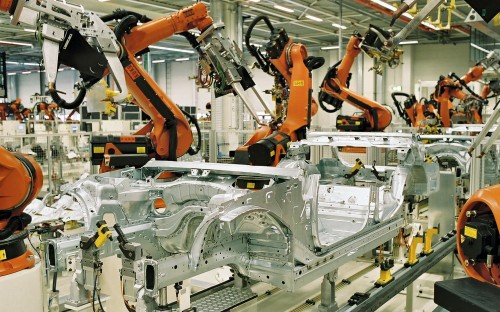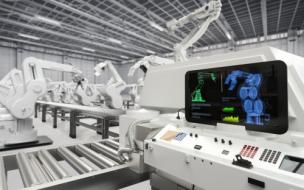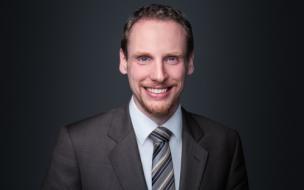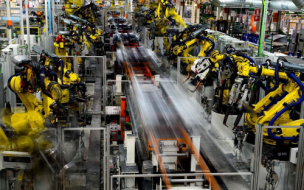RWTH Aachen University

Cyber-Physical Systems and Intelligent Robotics (CPS-IR)
This course provides methodical and technological skills and enables participants to identify application areas of CPS and robotics in their companies. They will learn to encounter technological challenges with suitable methods. This course addresses professionals who want to utilize the new possibilities enabled by the ongoing research on CPS and intelligent robotics.
The modular pick & mix structure allows participants to choose modules and time frames according to their own skills and needs.
Short Intensive Certificate Course:
This foundation module aims at an overview on the basic communication technologies in modern production facilities like OPC UA, DDS and RabbitMQ, taught throughout 5 intensive days.
Advanced Certificate Course:
Participants may continue after the foundation module with at least three of the advanced level modules (A 1 - A 4). The Smart Factory-module can also be chosen. These will help them to design and implement problem-specific solutions for challenging CPS or robotic tasks on the basis of their practical experience.
Any of the advanced modules can also be attended individually, each lasting 5 days.
Expert Training:
Having finished the foundation module and three of the advanced modules participants may deepen their knowledge in their particular field by also conducting a field project and a case study.
For detailed information and to access the application form please refer to
Due to variable product families and constantly decreasing product life cycles, previous methods to implement machines, facilities and processes and operating machines cease to be economic. Rather,
an increased front-loading – a deferral of efforts into engineering – must take place in the future. Fortification of digital assembly groups with metadata, virtual figures of facilities and machines as well as methods of simultaneous process protection bear great potential. By means of a continuously available digital chain of planning, new variants can be produced both efficiently and economically.
Designed for mechanical or electrical engineers (at least bachelor level) this course serves as an introduction to technical requirements and challenges for the digitalisation of production, providing technical and engineering-based approaches and concepts for implementation. Participants learn the necessary steps to put into practice a complete digital chain of planning – ranging from the product to a completed production process and beyond. Apart from classic topics like PLM (Product Lifecycle
Management), the potential of frontloading is demonstrated by means of examples, i.e. from assembly technique. Various basics from the engineering science sector related to the challenges of the next fully digitised production are conveyed with a focus on engineering. Theory will then be applied to participant-specific challenges in regards to digitalisation of production.
RWTH Aachen University - News


New technologies are transforming industry—and you need to know about it

As technology disrupts industries, more employers want professionals with hard, technical skills


Graduate Jobs: Maastricht Partners With RWTH Aachen To Prepare Grads For The Digital Era
Partnership with top German engineering university provides Maastricht School of Management students with the managerial and technical skills they need to compete

RWTH Aachen University professor says advanced technical skills will make students stand out in the jobs market

CPS-IR will help professionals to understand and to utilize machine intelligence

The subject area of acoustics (noise, vibration, harshness) is very important for the development of vehicles. Reasons are, on the one hand, predetermined exterior noise levels issued by the legislator for vehicle registration. Now that the respecitive guidelines have undergone revision, further reductions are pending. On the other hand, vehicle buyers and owners also display growing demands in terms of vibration and sound comfort. Measuring up to these demands is further impeded by conflicting aims between acoustics and other criteria like the reduction of both CO 2 and fuel consumption (efficient engines, downsizing, downspeeding, lightweight construction). Apart from
that, the acoustician is faced with entirely different challenges in terms of electric and hybrid vehicles. In order to find solutions for these tasks, acousticians require an informed understanding of the entire vehicle system.
This course is designed for engineers and technicians from the vehicle and supplier industry who would like to be given an extensive insight into the topic of vehicle acoustics. A special focus lies on
practical units. Knowledge of vehicle-specific, acoustic mode of action and the thereby ensuing corrective measures will be imparted. The course objective is for participants to gain a solid foundation knowledge in order to evaluate problems of vehicle acoustics.
Thanks to the close connection with the RWTH Aachen University, the RWTH International Academy as its subsidiary, can draw from the University’s whole scope of subjects. It thereby conceives scientifically sound and practice oriented programmes that are also in sync with market demands. These close ties to labs, research facilities, and testing centres make our continuing education an exceptional experience.
RWTH International Academy
RWTH Aachen University is the largest university of technology in Germany and stands as a worldwide centre for cutting-edge research and academic training that relates to real-world conditions, particularly in engineering and natural sciences. For such reasons, the RWTH has occupied a leading position in the German Collegiate Ranking System for years: for its leading reputation with prominent enterprises, its academic reputation and its high research success with an emphasis on real-life applications.
RWTH Aachen University
We provide thoroughly English-taught continuing education at RWTH Aachen University in Germany, with the scientific lead of highly qualified university professors and scientists.
- Your trainers are technology experts of the RWTH Aachen University with a scientific and didactic background as well as a broad experience from industrial projects.
- Course contents are directly applicable to the challenges in your companies, enabling you to develop and employ your own 4.0 strategies.
- A strong focus lies on networking and communication amongst participants and lecturers.
- You will receive an official RWTH Aachen University certificate which shows both course contents and course aims.
Our Professional Education Certificate Courses are constructed to further your career and give you the opportunity to see daily challenges from a different perspective and discuss them with fellow participants and professional lecturers from RWTH Aachen University. You will profit from the excellent didactic skills of your lecturers and be able to enlarge your personal and business network.
The RWTH Aachen University is one of Germany's Universities of Excellence. It is a place where the future of our industrialized world is thought out. The University is proving to be a hotspot with increasing international recognition where innovative answers to global challenges are developed.
The RWTH Aachen University's success in Germany's Excellence Initiative reflects its outstanding reputation for research and education in science, technology, and engineering fields.
RWTH Aachen University secures top places in university rankings every year:
- In 2015, the university was particularly successful in the field of mechanical engineering, which was ranked place 12 worldwide and the best German university within this subject. Source: QS World University Ranking by Subject.
- RWTH Aachen University is the university with the most alloted research funding in engineering. Source: German Research Foundation (DFG).
- With 260 institutes in nine faculties, the RWTH Aachen University is one of Europe's premier educational and research institution.
- There are currently 43,721 students enrolled in 152 courses of study. Education at the RWTH Aachen is application oriented, resulting in its graduates becoming young professionals and leaders that are highly sought after in the economy.
- The RWTH Aachen University receives the most third party research funding in engineering out of all German universities. Source: German Research Foundation (DFG).

Snapshots
- FT Ranking: 98
- Class Size: 25
- Scholarships Available: NO
- Course Length: Starting from 1 week
- Course Fee: 3,600 EUR
- Application Deadline: Deffering
The city of Aachen has a lot to offer and even during a limited stay you will be able to enjoy the qualities of the city and its cultural heritage. Aachen is located right at the “Border Triangle”, where the borders of Germany, Belgium, and the Netherlands meet. One attraction of living in this area are the short travel distances to cities such as Amsterdam, Brussels, Cologne or even Paris. Aachen is a safe, open-minded, multi-cultural, and not too big a city. Germany has a much lower crime rate than the US, Canada, or the UK according to the Global Study on Homicide 2013, published in April 2014, by the United Nations Office on Drugs and Crime (UNODC).
RWTH International Academy
gGmbH
Kackertstraße 10
52072 Aachen
T +49 241 80-97695
F +49 241 80-92525
info@academy.rwth-aachen.de





